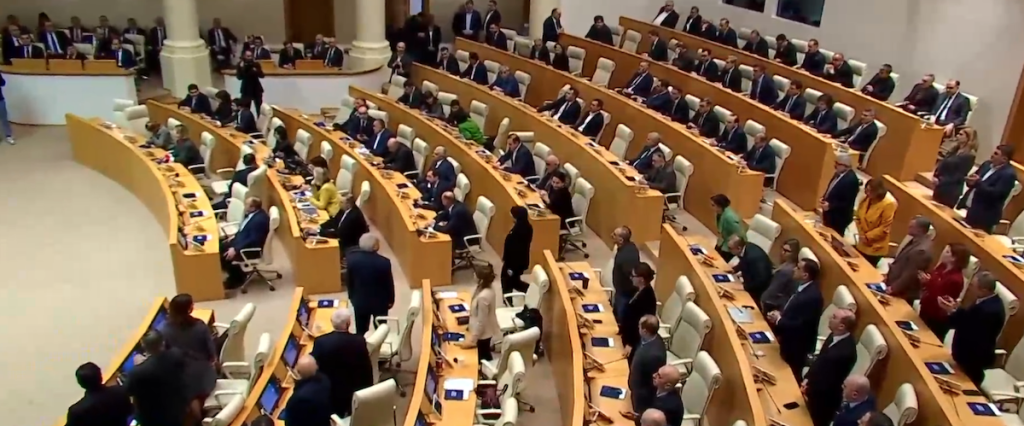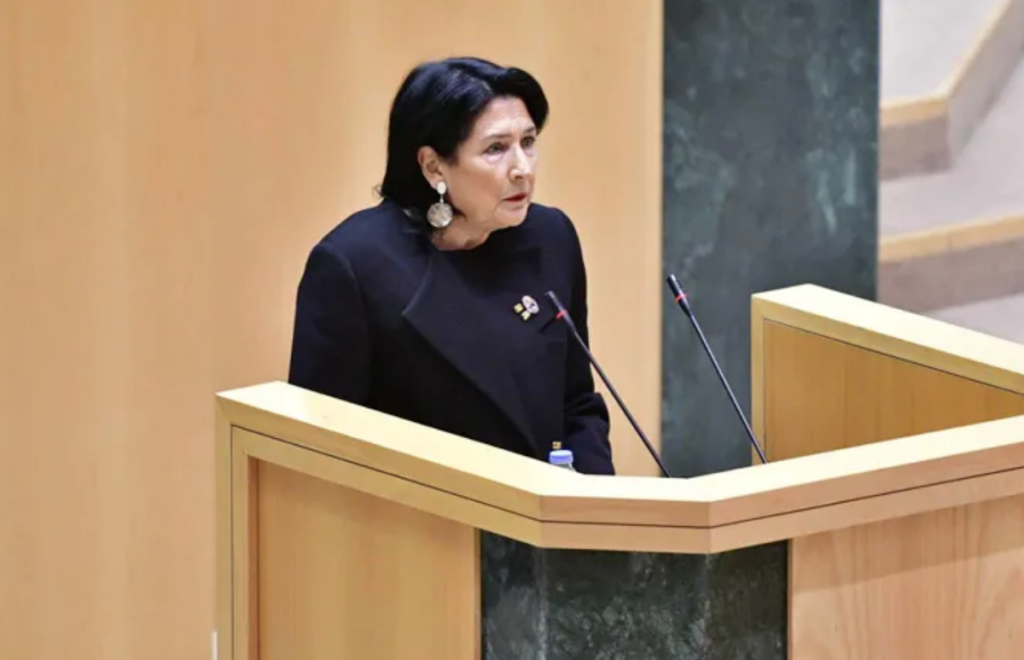"Ivanishvili is the main addressee of all questions" - Georgian president's last report to parliament
Georgian President’s last report to the parliament
In her final report to Parliament today, February 6, Salome Zurabishvili, the President of Georgia, emphasized that questions concerning corruption, foreign policy, and the state of the judicial system are primarily directed at oligarch and honorary chairman of the ruling Georgian Dream party, Bidzina Ivanishvili, whom she stated “effectively runs the country.”
The Georgian president also directed remarks towards prime ministerial candidate Irakli Kobakhidze, linking him to “the arrival of [Russian MP Sergei] Gavrilov” and “anti-European rhetoric.” Salome Zurabishvili addressed corruption within the elite and highlighted future hybrid threats from Russia, stating that Russia’s hybrid strategy relies on provocations such as “the arrival of a Russian cruise liner in the port of Batumi or an icon depicting Stalin.”
Upon entering the plenary hall, Georgian Dream MPs did not rise from their seats, marking the second occasion where members of the parliamentary majority did not greet the president. Previously, during the consideration of the president’s impeachment in October, the majority similarly remained seated.
“The crucial aspect is not that this marks the final occasion I address this podium [with the annual report]. What holds significance is that I stand here for the first time as president of an EU candidate country! I congratulate everyone on this achievement. This is a significant victory,” Zurabishvili remarked at the beginning of her speech.

What the president of Georgia said
“In today’s context, the primary recipient of societal inquiries is not the Prime Minister, the Speaker of Parliament, or the ruling party, but the individual who truly wields influence over the nation. Therefore, I am directing my remarks to Bidzina Ivanishvili.
The public has a legitimate expectation to hear your perspective – what is the significance of the statements you made regarding corruption and the country’s foreign policy upon your return to political engagement?
As the public anticipates a transition towards a new European model of governance, they also seek clarity on your plans for transitioning from a single-party, autocratic, and top-down model to a democratic and European framework.
The public awaits your response – when do you intend to remove Murusidze and Chinchaladze [high-ranking lawyers targeted by U.S. sanctions]? On one hand, you claim to be combatting (or so you assert) the National Movement, yet on the other hand, no action seems to be taken against its remnants.”
- “Georgian President freed herself from ‘Ivanishvili complex’ and called a spade a spade” – Opinion
- Experts on the attempt to impeach the Georgian President
- Bidzina Ivanishvili has nominated the chairman of the ruling party for the position of Prime Minister of Georgia
You are associated with Gavrilov’s presence here and with anti-European rhetoric- Zurabishvili addressed Irakli Kobakhidze.
President Salome Zurabishvili also directed remarks towards prime ministerial candidate Irakli Kobakhidze:
“As the President of this country, I refrain from preemptively assessing either the previous or future Prime Minister. However, I feel compelled to address the concerns of the public and articulate the answers they seek. This transparency to the public is a fundamental tenet of democracy.
To the incoming or prospective Prime Minister, particularly one associated with Gavrilov’s presence in Parliament, the nullification of the Charles Michel document [referring to Georgia’s withdrawal from the Charles Michel Agreement of April 19], anti-European rhetoric, and impeachment: How do you propose to instill European values in our society? Furthermore, how do you plan to implement EU recommendations prior to the upcoming elections?”
“We witnessed the emergence of a liberated European youth.
“The country’s European orientation also encountered challenges – our longstanding trajectory gradually shifted focus: anti-European and anti-Western sentiments transitioned from fringe political circles to official rhetoric.
“Simultaneously, attitudes towards Russia noticeably softened. The escalating tensions with Ukraine, public divergence from the EU and the U.S. amidst international sanctions raised doubts about the resilience of our foreign orientation. With ambiguous rhetoric and actions, we placed the significant progress and accomplishments we had attained on the path of European integration at risk. Despite these obstacles, Georgia emerged victorious and secured candidate status!”
The society persevered, fought, and safeguarded its future. The resilience of the people demonstrated to everyone, both domestically and internationally, that our pursuit of European values is justified and the spirit of the Georgian people is unwavering in this endeavor. Our society has gained confidence in its abilities and determination to achieve its objectives. We have witnessed the presence of our liberated European youth, underscoring their significant role in shaping the nation’s future, and the youth has emerged as a beacon of hope.
Drawing upon our society’s experience, characterized by traditional tolerance, wisdom, and restraint, we navigated and resisted the provocations of Russian immigration and propaganda. Rather than engaging in confrontation with Russia’s hybrid tactics, our society upheld stability and maintained a steadfast pro-European stance.

“The ambitions of the elites know no bounds
“Corruption has reached unprecedented levels, signaling that the appetites of the elite class are insatiable, and in reality, there is no oversight or accountability. Corruption within the elite ranks serves as the essential glue that binds the caste around centralized power.
“The idolization of authority is a direct legacy of the Soviet era, characterized by its hierarchical structure, single-party governance, autocratic leadership, culture of obedience, readiness to compromise integrity for survival, and the culture of denunciation. I am referring to the Soviet regime, with its mechanisms of compromising materials, surveillance, clan politics, and servitude.”
Since gaining independence, no government has managed to muster the strength and determination necessary to dismantle the entrenched power structure and restore a democratic equilibrium.
This system thrives on the suppression of opposition voices. It neither desires political adversaries nor welcomes critical viewpoints. Consequently, any alternative perspective is swiftly vilified, branded as treacherous, subversive, or radical, with no avenue for appeal: “Anyone who challenges my authority is betraying the nation.” Compromise is viewed as a tool for discrediting and undermining, while bribery serves as a more subtle form of coercion.
- The Georgian PM’s retired father gave him another fat sum – $66,500. How did he afford it?
- “We have no other oligarch but Ivanishvili” – Georgian President speaks out against Bidzina Ivanishvili
“The hybrid strategy relies on provocations, such as a Russian cruise ship docking in Batumi or the depiction of Stalin’s image on an icon in Sameba cathedral.”
“Along the occupation line, there persists a pattern of continuous intimidation, harassment, kidnappings, and killings. State-sponsored anti-Western propaganda, the promotion and funding of pro-Russian groups, and the escalation of cyber attacks on state institutions are indicative of what to anticipate during the upcoming elections.
Hybrid warfare tactics also encompass substantial Russian immigration, which directly impacts the economy and enhances the country’s reliance on Russian investment and markets, as well as the prevalence of Russian capital within the nation.
Moreover, the hybrid strategy entails various provocations, including the resumption of direct flights from Russia to Georgia, unhindered visits by Russian officials, the presence of a Russian cruise ship in Batumi’s port, and the display of a Stalin icon at Sameba Cathedral. These actions aim to sow discord, provoke confrontation, and instill a sense of societal destabilization.”
“Cease the internal strife, and come to consensus on our nation’s priorities,” the president addressed the opposition.
“We implore the opposition to recognize its own share of responsibility. The ceaseless infighting and discord only breed despair and cynicism among the populace.
While it’s not my role to dictate your actions – whether to unite or disband – I emphasize the importance of reaching consensus on fundamental national objectives. It’s imperative that you demonstrate to the public your capacity for dialogue and concerted effort toward achieving our shared European aspirations. The primary duty of the opposition is to mobilize and involve the public in advocating for our European path.”
“Let’s establish a roadmap for our collective future – a Unity Platform for Europe.
“Our shared objective is a European destiny, and to realize this vision, we must align on key priorities. This can be achieved through the establishment of a unified platform. Hence, we propose the creation of a roadmap for the future – a ‘Unity Platform for Europe’!
“I am prepared to shoulder the responsibility for spearheading this initiative and to establish, with the assistance of my administration, a coordinating body tasked with consolidating all concrete proposals regarding European priorities. Through dialogue and consensus-building, this center will facilitate the development of a collaborative document.
“To this end, I plan to convene representatives from the nation’s political landscape and stakeholders from civil society in the upcoming days. This inclusive approach underscores my readiness to engage with and listen to all voices.”
Georgian President’s last report to the Parliament


















